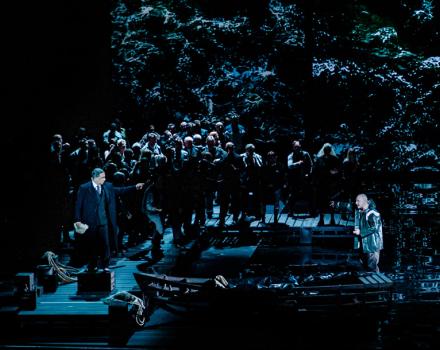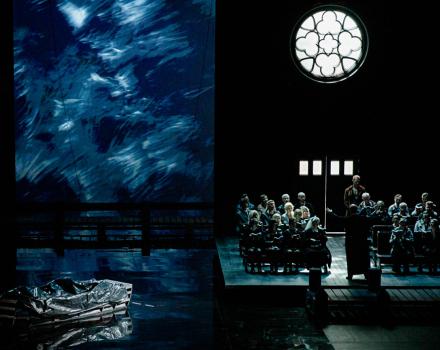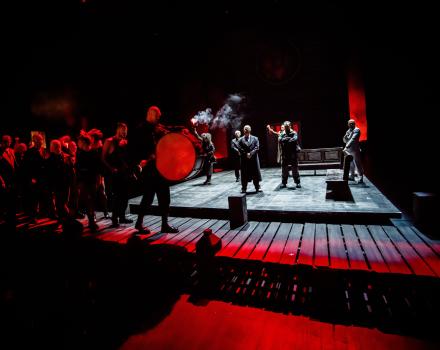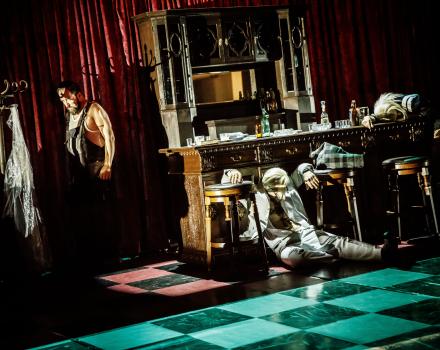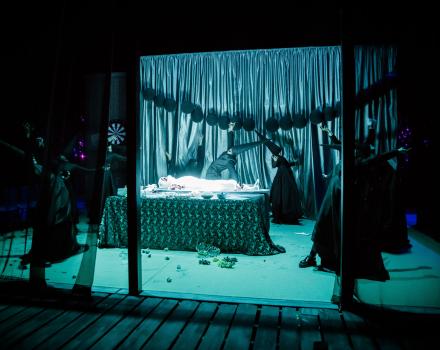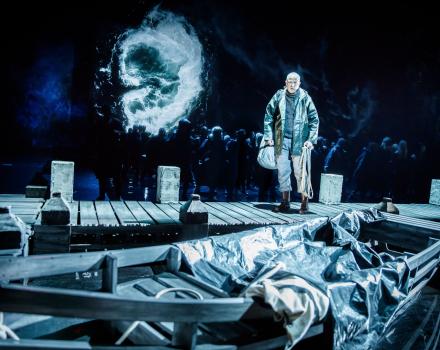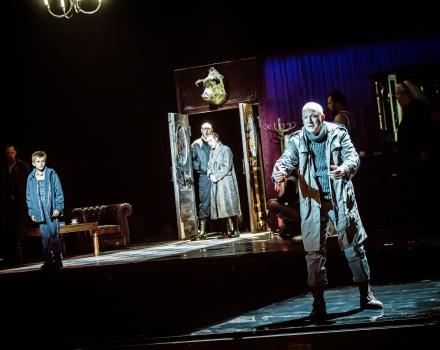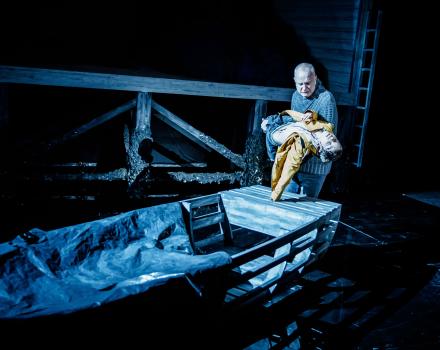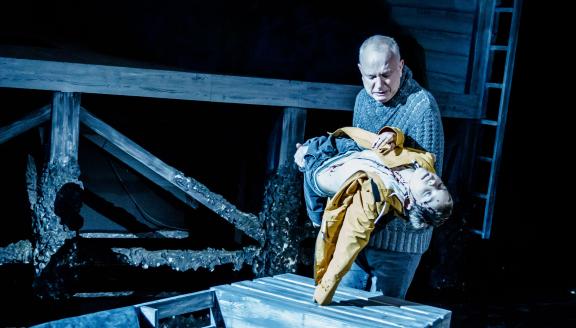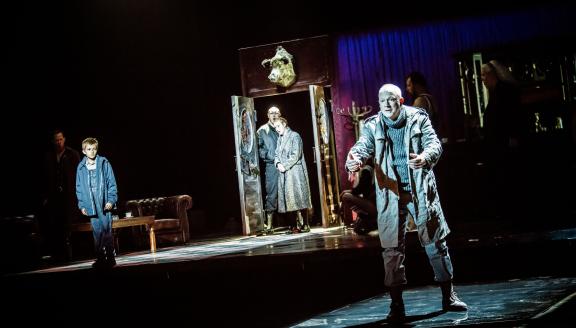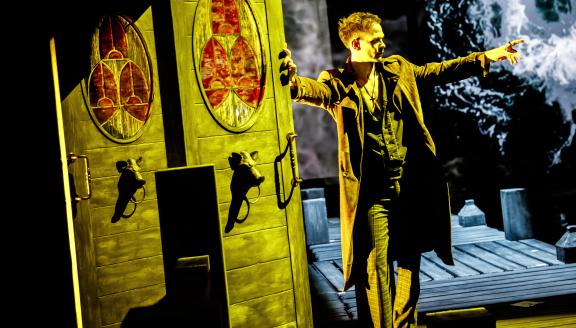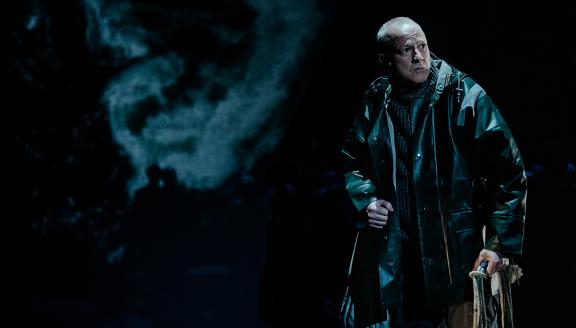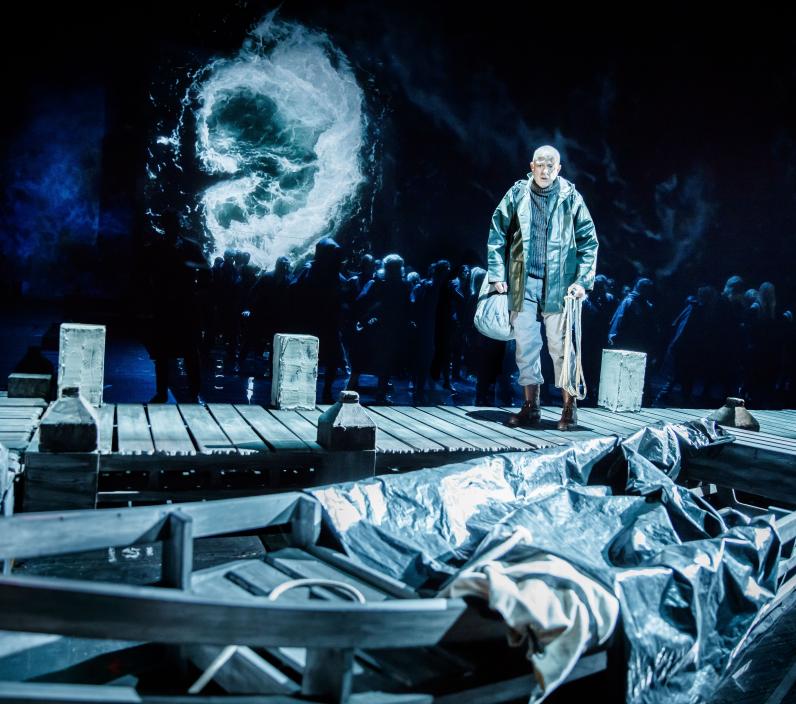
Peter Grimes lives from fishing. Raw and recluse, he finds himself at odds with the local community who accuse him of brutality towards his young apprentices and blames him for the death of one of them. A few friends stand up for him - Ellen Orford, a widow whom he wants to marry, Balstrode a retired sea captain, and an apothecary Ned Keene - but Grimes remains a mysterious figure. What really happened to his missing apprentice, and was he involved?
Aldeburgh, a small fishing village in Suffolk on the east coast of England, is where composer Benjamin Britten was born and spent most of his life. Aldeburgh was also where poet George Crabbe lived and worked, writing in 1820 a poem The Borough whose story, about a violent recluse ostracised by the Aldeburgh fishing community, captivated the young Britten. Peter Grimes premiered in Sadler’s Wells theatre London in 1945 to ecstatic reviews. Polish National Opera’s new production is staged by its artistic director Mariusz Treliński, who has done much to promote Britten’s music in Poland, including a staging of Billy Budd. Michał Klauza conducts a fine cast which includes the tenor Peter Wedd, who plays the complex protagonist, alongside soprano Cornelia Beskow as the empathetic Ellen Orford and baritone Krzysztof Szumański as the retired captain Balstrode, whose condemnation seals Grimes’s fate.
CAST
|
Peter Grimes
|
Peter Wedd
|
|---|---|
|
Ellen Orford
|
Cornelia Beskow
|
|
Balstrode
|
Krzysztof Szumański
|
|
Auntie
|
Wanda Franek
|
|
Niece 1
|
Aleksandra Łaska
|
|
Niece 2
|
Maria Stasiak
|
|
Boles
|
Mateusz Zajdel
|
|
Swallow
|
Dariusz Machej
|
|
Mrs Sedley
|
Jadwiga Postrożna
|
|
The Rev Horace Adams
|
Aleksander Kunach
|
|
Ned Keene
|
Szymon Komasa
|
|
Hobson
|
Lukas Jakobski
|
|
John, a boy
|
Oskar Grzegorzewski
|
|
Dancers and Mimes
|
Mayu Gralińska-Sakai
Katarzyna Hołtra-Kleiber
Monika Jarosińska
Hanna Szurgot
Monika Daukszo
Katarzyna Koziorz
Krzysztof Czerny
Michał Ciećka
Damian Zawadzki
Paweł Kozłowski
|
|
Orchestra
|
Polish National Opera Orchestra
|
|
Chorus
|
Polish National Opera Chorus
|
| ... | |
|
Music
|
Benjamin Britten
|
|---|---|
|
Text
|
Montagu Slater
|
|
Conductor
|
Michał Klauza
|
|
Director
|
Mariusz Treliński
|
|
Dramaturgy
|
Marcin Cecko
|
|
Sets
|
Boris Kudlička
|
|
Costumes
|
Marek Adamski
|
|
Choreography
|
Jacek Przybyłowicz
|
|
Lighting
|
Marc Heinz
|
|
Video
|
Bartek Macias
|
|
Photography
|
Michał Dąbal
|
|
Make-up
|
Waldemar Pokromski
|
|
Chorus master
|
Mirosław Janowski
|
|
Film directors
|
Marcin Dunin-Borkowski
Ewa Krasucka
|
|
Sound Director
|
Emilian Rymarowicz
|
| ... | |
Videos
Story
Prologue
Peter Grimes returns from fishing. His young apprentice is dead. The police are securing the evidence. Grimes is in a state of shock. An inquest is being held. Grimes is accused of causing the boy’s death and must give a public testimony. The local residents are certain that Grimes is guilty; the fisherman denies the accusations. The coroner accepts his testimony as true and finds him innocent, but forbids him to take another apprentice. The local residents object to the coroner’s conclusion: they know better. For them, Grimes is a murderer. After the inquest, Ellen Orford, the only person in the village favourably disposed towards Peter, tries to reassure him. Grimes is distrustful but yearns for comforting words. The woman tries to convince him that he can regain the community’s trust. When left alone, Grimes has a vision of the dead boy; his guilty conscience haunts him.
Act 1
It is a Sunday morning as the last drunken customers are leaving the Boar, the local pub, heading straight for church. The peace and quiet of the ceremony is disrupted by the arrival of Grimes, who provocatively addresses the congregation, begging them desperately for help and attention. Almost everyone is against him, he is surrounded by seething hatred and conspiracy of silence. Only Balstrode, an old sailor, takes his side. The residents discuss whether they should help Grimes. Contrary to what the majority thinks, Ned Keene, the local apothecary, decides to arrange for a new apprentice for Peter as he is not able to go out fishing without help. Hobson, who is charged with fetching the boy, despises Grimes more than the others. He publicly insults the fisherman, yet gives in to Ellen’s pleadings and the two set off to pick up the boy.
Mrs Sedley approaches the apothecary for a new supply of laudanum, a powerful sedative. Keene arranges to meet her at the pub that evening, a place the very proper Mrs Sedley has never visited before.
A storm is drawing near. The residents are fearful of the mighty forces of nature. Despite the ominous weather, Grimes is getting ready to sail out. Balstrode advises him to leave the village and escape his bad reputation. Grimes feels unfairly judged and thinks back to the dreadful day when he failed to bring in a large catch of fish and his apprentice died of exhaustion. Now, he wants to try his luck again, regardless of the risk, to make his fortune, earn his independence and marry his love Ellen. Balstrode ridicules his dreams. The storm picks up but Grimes decides to set out to sea.
Mrs Sedley, all in a fluster, enters the Boar, a local hot spot for debauchery, to pick up her pills from Keene. Nobody is in yet, except for Auntie, the proprietress. Soon the pub starts to fill up with customers sheltering from the rain and storm. It is the only entertainment venue in town open throughout the night that offers attractions that nobody dares to mention in bright daylight. Boles, a drunken hypocrite and self-appointed preacher, comes on to young girls. Keene arrives with the news of storm damage. Grimes’s house was affected. Forlorn, Grimes wanders around the pub, waiting for his apprentice to arrive. When he steps inside, he is attacked by the drunken patrons. Insults and accusations fly about. Boles lays into the fisherman and breaks a bottle on his head. Grimes is bleeding. Hobson, Ellen and the boy, John, arrive. Peter takes his new apprentice home.
Act 2
A cheerful Sunday morning. Ellen and John stroll along the seafront. Ellen presents the quiet, introverted boy with a gift, a hand-knit sweater adored with an anchor motif. She notices a bruising on the boy’s neck and starts suspecting Grimes of mistreating the apprentice. When Peter turns up to take the boy off fishing, Ellen objects, claiming the boy is overtaxed. Grimes wants to work and earn enough money to marry her. When she asks him about the bruising, a violent argument erupts, causing Ellen to break off with Peter. Crushed, Grimes takes the boy away.
The argument is observed closely by Auntie, Ned and Boles from inside the church. Seeing Grimes’s reactions, they suspect him of violence. Insinuations turn into accusations. The sense of tension and impending lynching is palpable in the air. Ellen admits to failure: her plan to help Grimes has come to nothing. This is the last straw that pushes the crowd over the edge. They decide to stop Grimes. The Pastor organises a march heading to his house. Hobson takes the lead. The men light up torches.
Grimes is asleep, dreaming about the dead boy. He wakes up and starts hectically getting ready for fishing. He tells John to get dressed quickly, yelling for him to hurry up. John puts on the dead boy’s jacket. Peter starts hallucinating. He has a premonition of the lynching. Seeing the mob approaching, he panics. Obsessed with the large catch, he hurries the boy to the sea. John falls down the cliff.
The Pastor, Mr Swallow, the coroner, and Ned Keene enter Grimes’s house. The hut is empty. They fail to find any evidence. Their amateurish investigation falls flat. The vigilantes feel embarrassed by their rash accusations. Swallow lectures everyone not to believe rumours and mind their own business.
Grimes finds John’s dead body by the sea. His death is the conclusive proof that Peter is a murderer. Nobody will believe Grimes now, he is doomed.
Act 3
A dance is to be held in the village. Grimes roams the still empty hall, looking a shell of a man. He tries to take his life, but is scared away by Swallow and the Nieces. The ageing coroner is trying to seduce the girls, the three of them are flirting. The dance starts.
Grimes cuts his wrists. He is in a trance. Bleeding, he walks unnoticed among the drunken residents, then retires to his boat. Everyone talks about his absence. They are worried that both Grimes and the boy have disappeared. The determined Mrs Sedley decides to look for the evidence of his crime on her own. She is sure the fisherman killed the boy.
Balstrode and Ellen notice Grimes’s boat by the shore. Ellen finds the anchor sweater all stained with blood. This might point to the worst. Mrs Sedley keeps looking about for Grimes. She finally manages to locate his boat. Panic grows. Everyone gathers up to lynch Grimes, but he is nowhere to be found.
Dying, Grimes sees himself as a sacrificial offering, mercilessly prosecuted for the murders and eaten alive as part of a mysterious rite. His boat sails out of the fog. Grimes staggers from pain and loss of blood. Lying on the shore all alone, he is delirious and cannot hear the voices of Ellen and Balstrode searching for him. He dies.
Another church service is held at the local church. It symbolises the restoration of harmony in the village. The evil is gone. The sea has engulfed Grimes’s body as if it were an unwanted burden on the community. The congregation prays fervently, pretending that nothing happened.
Gallery
